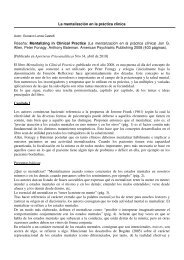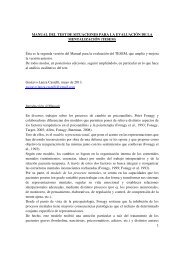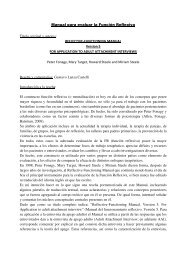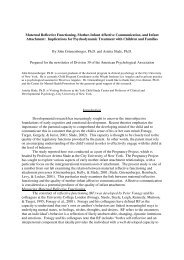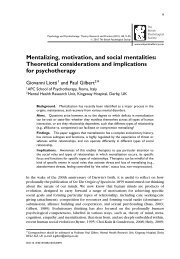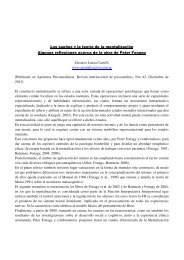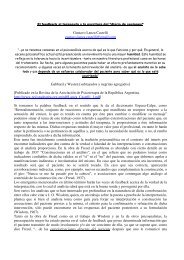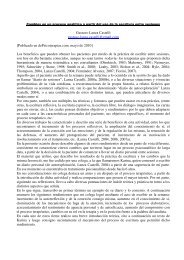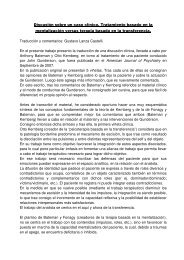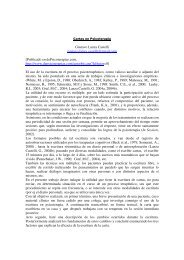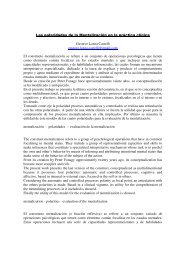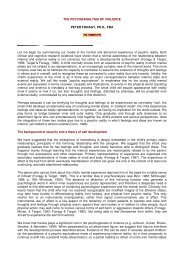Mentalization, Mental States and Affect Elaboration - mentalizacion y ...
Mentalization, Mental States and Affect Elaboration - mentalizacion y ...
Mentalization, Mental States and Affect Elaboration - mentalizacion y ...
You also want an ePaper? Increase the reach of your titles
YUMPU automatically turns print PDFs into web optimized ePapers that Google loves.
Component Study 1: An Empirical Study of a Successful <strong>and</strong><br />
Unsuccessful Psychotherapeutic Process: Positive <strong>and</strong> Negative<br />
Transference-Countertransference Cycles <strong>and</strong> Complementarity<br />
in Linguistic Styles<br />
Aims<br />
To further our underst<strong>and</strong>ing of the interactive cycles of transference <strong>and</strong><br />
countertransference projection <strong>and</strong> re-introjection by testing an operational differentiation<br />
of mental states <strong>and</strong> linguistic style, using two instruments: the MTCM (Montreal<br />
Transference Countertransference Measure; Bouchard et al., 2001) <strong>and</strong> its associated<br />
PNRC (Audet, 2001), <strong>and</strong> the LLSM (Liberman Linguistic Styles Measure, Wiethaeuper,<br />
1999) based on concepts of interactive communication proposed by D. Liberman (1983).<br />
Methods<br />
The clinical material is of a male experienced psychoanalyst meeting two patients for an<br />
open-ended trial of psychoanalytic psychotherapy, twice a week, face to face (patients A<br />
<strong>and</strong> B). Patient A prematurely interrupted her therapy after 14 sessions <strong>and</strong> is considered<br />
a failure; patient B moved on to a successful outcome for a total of 234 sessions. It was<br />
decided to compare <strong>and</strong> contrast the first 14 sessions from each pair. In addition the<br />
Defense Mechanisms Rating Scales (Perry, 1993) was also coded for all sessions.<br />
Within the MTCM transference is construed within an object-relations framework, with a<br />
consideration of three manifest situations (transferential, extra-transferential <strong>and</strong> past), an<br />
indication of displacements <strong>and</strong> allusions (Gill, 1979), <strong>and</strong> finally of defensive turning of<br />
aggression against the self (Gray, 1994). Countertransference includes independent<br />
ratings of (a) the therapist's interpretative focus (transferential or not, awareness or<br />
resolution, etc.); (b) the degree of inference (clarification, direct opinion, confrontation<br />
<strong>and</strong> interpretation); (c) a differentiation between three in-session mental states: objectiverational,<br />
reactive <strong>and</strong> reflective (Norm<strong>and</strong>in, 1991; Norm<strong>and</strong>in & Bouchard, 1993).<br />
Positive <strong>and</strong> negative relationship configurations (PNRC, Audet, 2001) were defined. To<br />
represent the present state of the relationship, being specified as either negative, positive<br />
or neutral. Configurations are identified based on both participant's mental states<br />
(reflective, reactive, objective-rational) <strong>and</strong> on the confirmation or disconfirmation of the<br />
patient's projected relational scenarios within the interaction.<br />
The LLSM contains a detailed presentation of Liberman's six linguistic styles (Liberman,<br />
1983): a) Reflexive who searches for the unknown (incognito) <strong>and</strong> does not create<br />
suspense (non-participant observer); b) Lyrical c) Epic (action, or pragmatic aspect) d)<br />
Narrative (Logic) e) Dramatic style with suspense (the frightened person who uses the<br />
dramatization, <strong>and</strong> appeals to verbal incognitos) f) Dramatic style with aesthetic impact<br />
(theatrical, demonstrative). In addition, the LLSM included a description of a Concrete<br />
style. See below for more information on the LLSM.



